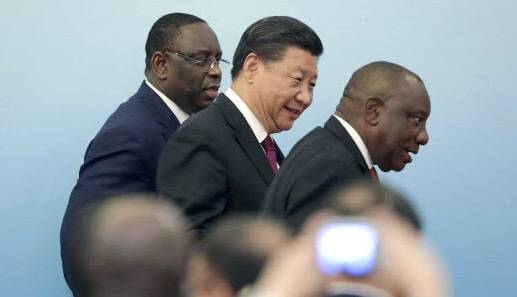Objectives such as achieving good governance, promoting democracy at the continental level, as well as improving the levels and types of security, were among the issues that were discussed by the two sides. The United States also announced that it will allocate 55 billion dollars to Africa over the next 3 years.
Regardless of the normative goals of such a conference, it seems that allocation of this amount by Washington is the reaction of a world power to an emerging power in a third region. China, which gradually began its presence in the African continent since 1990, stabilized its presence in 2013 based on the Belt and Road Initiative. However, it is believed that the United States has no plan to give the field to the Red Dragons easily.
It is clear that the plan for a stronger presence of the United States in Africa will turn the continent into a field of geopolitical competition. A competition that includes the two components of security and economy and may last for long.
According to global statistics, the continent of Africa will house nearly 40 percent of the world’s population by the end of this century. Also, the largest regional growth is predicted in this continent. In addition to these, existence of a huge amount of oil, gas, natural resources, as well as materials such as palladium and lithium cause most of the world’s future industries to feel the need for Africa and its resources. In such a situation, China, the United States, France and even Russia consider presence in Africa as a vital matter, although the main competition will still be between Beijing and Washington.
Progressing China an alarm for the US
The current state of the competition is clear in the statistical difference. According to statistics published in 2021, China has nearly 250 billion dollars in bilateral trade with Africa. Meanwhile, trade between the United States and Africa is only 63 billion dollars. In addition to this 4-fold difference, Beijing is the largest lender to the countries in the region, contrary to the United States which held a joint summit with African countries after 8 years, China takes a similar action every 3 years, and many Chinese companies have an active presence in the development of infrastructures and extraction of raw and natural materials. On the other hand, most American companies do not have a significant economic and commercial activity in Africa due to the unwillingness or lack of sufficient support from the federal government.
Although the issue of economy is of double importance, China has been able to create a place for itself in the African continent in terms of security. In 2017, the country’s first military base was completed in Djibouti. In Equatorial Guinea, China is planning to build and complete naval bases by developing port facilities. However, it should be emphasized that Beijing currently has no intention of turning Africa into a field of security competition with the United States or even involving itself in the security relations of that continent. An example of this claim is the civil war in Ethiopia, where China, despite sending a special peace envoy, adopted its desired policy of non-intervention.
At the same time, the strategy of the US government, which was published in August this year, presents China as using Africa as an important arena to challenge the international order in order to advance its commercial and geopolitical interests, and therefore pursues weakening and limiting the United States. The West believes that by providing loans to African countries, China will put them in a debt trap and force them to comply with its demands. Although this vision defines the goal, implementation and presence in the African competition field requires other effective efforts and strategies.
US strategies, competitive landscape
Although the slogan ‘America enters’ heralds another geopolitical contest, it would not be too difficult to predict an African future in which the United States will campaign hard and China will remain a powerful player. Both Washington and China know that today the world is no longer the same as it was at the end of the 19th century, and today’s marginalized Africa, which comprises only 3 percent of the world economy, is more aware of its current and future capacities than they are, and is hungry to move forward.
In order to strengthen its presence and position in Africa, the United States knows very well that putting pressure on African countries to move in its desired direction can have negative and counterproductive results. American officials strongly stated at the recent summit that the US administration will not seek to choose between them and others by African countries. The US is looking for a stronger economic presence and especially increasing the amount of direct investment in Africa. Many US companies will be more competitive than their Chinese counterparts in the healthcare, financial technology and renewable energy sectors.
In addition, the US is trying to diversify its investments in Africa and not limit it to the extraction of primary and natural resources; a case in which China overdoes it. The US also hopes that Africans will understand the advantage of doing business with the United States than with China.
The third thing is redefining obligations, focusing on values that are important for African nations, focusing on civil society, promoting democracy, and also trying to realize open societies will be part of those obligations. Finally, both China and the United States must compete in some way in the African continent which should not be a reminder of the bitter era of colonialism and looting of this continent.










0 Comments